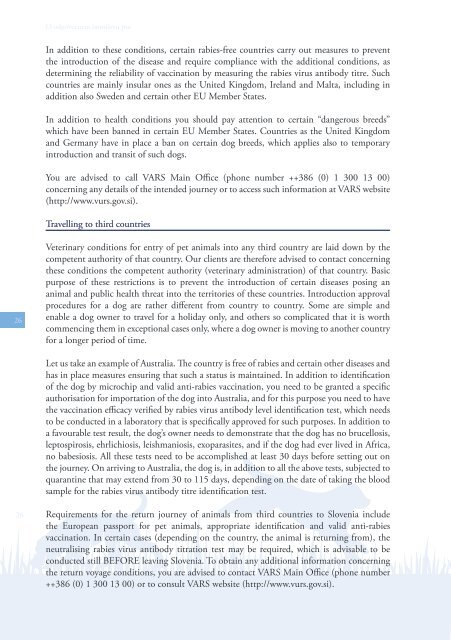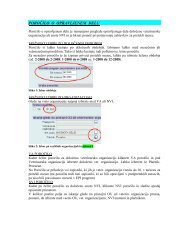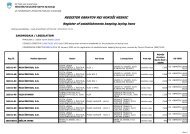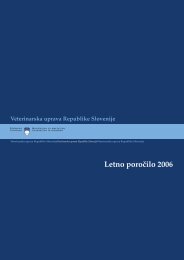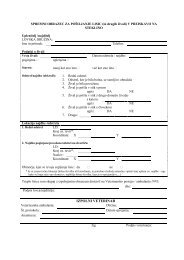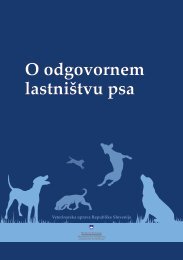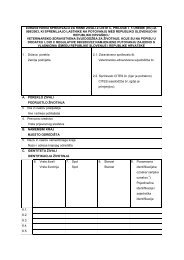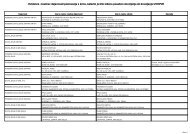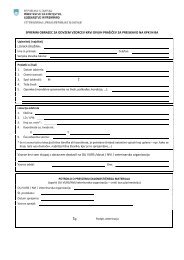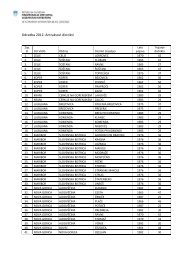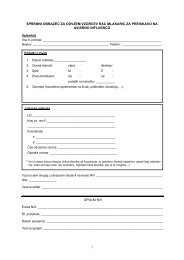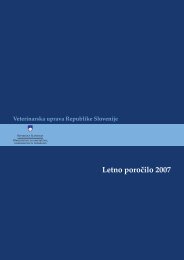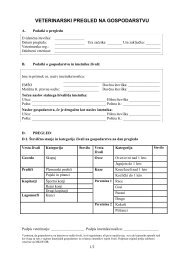Responsible Dog Ownership
Responsible Dog Ownership
Responsible Dog Ownership
You also want an ePaper? Increase the reach of your titles
YUMPU automatically turns print PDFs into web optimized ePapers that Google loves.
O odgovornem lastništvu psa<br />
In addition to these conditions, certain rabies-free countries carry out measures to prevent<br />
the introduction of the disease and require compliance with the additional conditions, as<br />
determining the reliability of vaccination by measuring the rabies virus antibody titre. Such<br />
countries are mainly insular ones as the United Kingdom, Ireland and Malta, including in<br />
addition also Sweden and certain other EU Member States.<br />
In addition to health conditions you should pay attention to certain “dangerous breeds”<br />
which have been banned in certain EU Member States. Countries as the United Kingdom<br />
and Germany have in place a ban on certain dog breeds, which applies also to temporary<br />
introduction and transit of such dogs.<br />
You are advised to call VARS Main Office (phone number ++386 (0) 1 300 13 00)<br />
concerning any details of the intended journey or to access such information at VARS website<br />
(http://www.vurs.gov.si).<br />
Travelling to third countries<br />
26<br />
Veterinary conditions for entry of pet animals into any third country are laid down by the<br />
competent authority of that country. Our clients are therefore advised to contact concerning<br />
these conditions the competent authority (veterinary administration) of that country. Basic<br />
purpose of these restrictions is to prevent the introduction of certain diseases posing an<br />
animal and public health threat into the territories of these countries. Introduction approval<br />
procedures for a dog are rather different from country to country. Some are simple and<br />
enable a dog owner to travel for a holiday only, and others so complicated that it is worth<br />
commencing them in exceptional cases only, where a dog owner is moving to another country<br />
for a longer period of time.<br />
Let us take an example of Australia. The country is free of rabies and certain other diseases and<br />
has in place measures ensuring that such a status is maintained. In addition to identification<br />
of the dog by microchip and valid anti-rabies vaccination, you need to be granted a specific<br />
authorisation for importation of the dog into Australia, and for this purpose you need to have<br />
the vaccination efficacy verified by rabies virus antibody level identification test, which needs<br />
to be conducted in a laboratory that is specifically approved for such purposes. In addition to<br />
a favourable test result, the dog’s owner needs to demonstrate that the dog has no brucellosis,<br />
leptospirosis, ehrlichiosis, leishmaniosis, exoparasites, and if the dog had ever lived in Africa,<br />
no babesiosis. All these tests need to be accomplished at least 30 days before setting out on<br />
the journey. On arriving to Australia, the dog is, in addition to all the above tests, subjected to<br />
quarantine that may extend from 30 to 115 days, depending on the date of taking the blood<br />
sample for the rabies virus antibody titre identification test.<br />
26<br />
Requirements for the return journey of animals from third countries to Slovenia include<br />
the European passport for pet animals, appropriate identification and valid anti-rabies<br />
vaccination. In certain cases (depending on the country, the animal is returning from), the<br />
neutralising rabies virus antibody titration test may be required, which is advisable to be<br />
conducted still BEFORE leaving Slovenia. To obtain any additional information concerning<br />
the return voyage conditions, you are advised to contact VARS Main Office (phone number<br />
++386 (0) 1 300 13 00) or to consult VARS website (http://www.vurs.gov.si).


